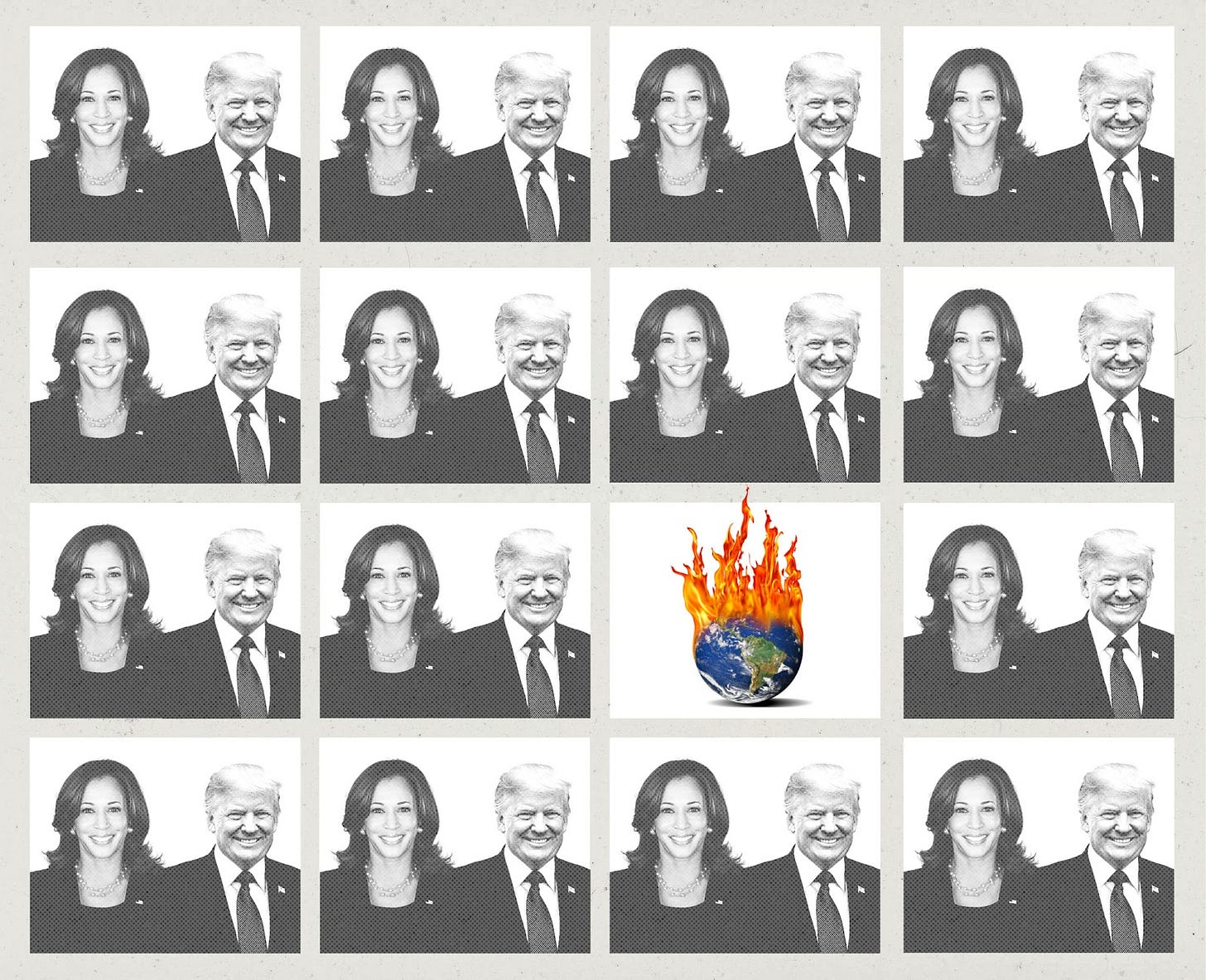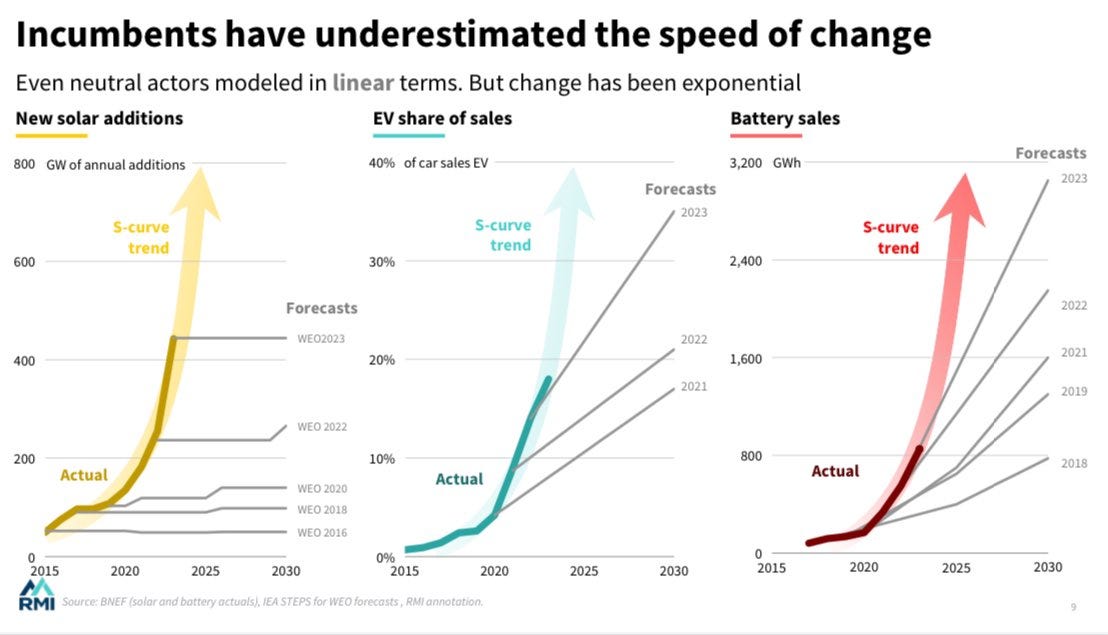Friends,
This is a time for despair. It is also a time for hope. At least for this installment of Redburn Reads, I’m going to lean toward hope.
Donald Trump seems determined to bring a wrecking ball to Washington and he can certainly do plenty of damage. But on the most critical issue facing humanity, his love affair with fossil fuels and his disdain for the threat that climate change poses to our civilization is running up against a surprising reality: solar power is winning the race to be the cheapest, most abundant source of new energy in the world.
Art by Katie Kosma
I haven’t posted in months on X, Elon Musk’s dumpster fire, but I still go there in search of useful information. Here’s an example, from Nicholas Fulghum, an energy expert at Ember, a global energy think tank.
nicolasfulghum (@Nicolas Fulghum) posted: One source of hope in this changing political environment is that the energy transition is not just built on political ambition, but on economics and technology, and solar
is winning on both fronts.
Example: Solar generation in Texas is seeing some massive new records in 2024.
Similarly Jan Rosenow, an energy researcher at Oxford University, is a frequent poster. Here are two examples of his recent efforts to enlighten us about the rapid progress of alternative energy sources.
Batteries prices continue to fall. A more than 90% drop over the past 15 years. Innovation and learning curves keep driving battery prices down.
2:21 AM · Nov 12, 2024·39.6K Views
Why I’m optimistic about the energy transition: Humans tend to underestimate the pace of innovation and overestimate the inertia of incumbent technologies. Clean energy technologies have scaled much more rapidly than predicted by modellers
5:00 AM · Nov 16, 2024·18.2K Views
And even Bill McKibben, an essential and often pessimistic voice in raising the alarm over climate change, is also trying to draw attention to the progress underway in installing solar technology. Here’s McKibben’s fascinating take in the Columbia Journalism Review on what he calls the most important news that is hiding in plain sight.
We know who the winners are and what their power means. But after the prolonged carnival of primaries and conventions, polls and bombshells, there was something else happening, far bigger in scale and importance. I’m willing to bet that not six voters in a hundred knew about it.
What happened was a rapid and alarming spike in the temperature of the earth. Temperatures have been increasing for decades now, a steady and ominous rise of the mercury. But beginning in the spring of 2023—beginning, ironically, with the onset of the political season in the United States—the ramp-up turned into a ski jump. Suddenly temperatures were soaring, month after month setting new all-time records. The scientists who study such things told us that the earth was experiencing temperatures higher than any in at least the past 125,000 years. . .
But the news mostly missed the other half of this story too, the good news. How many people could tell you that, over the course of America’s campaign cycle, we passed the line where humans are installing a gigawatt’s worth—a nuclear power plant’s worth—of solar panels each day? Not many, I think, because when I supply that news to crowds of (environmentally interested) people they audibly gasp in pleasure. . . . California has used a quarter less natural gas to generate electricity this year than last because its solar panels and batteries have finally achieved critical mass. A quarter less natural gas in a year in the world’s fifth-largest economy is the biggest single bite yet taken out of the eventual temperature of the earth, and yet it is passing mostly unnoticed. A tiny minority of our readers understand that solar and wind power are now the cheapest power on earth. They still think of them as the Whole Foods of energy, when in reality they’re the Costco—cheap, and available in bulk.
The longtime human (and journalistic) conceit that the natural world is a subset of the economic one, and that the political reality is the most important one, will now be tested. Our political campaigns—thanks to the candidates and to the people who cover them—have not prepared us for the moment now dawning. We barely discussed, for instance, the fact that the insurance system is breaking apart under the stress of climate change. . . We are wandering too blindly into an impossible future.
I’ve missed many important stories in my own career as an economics journalist. But maybe in the few years I have left I can help bring a little attention to a few of the things happening in this world that we need to see.
Take care,
Tom









Thanks, Tom! I finally pulled the plug on my Twitter account just a few minutes ago. Hopefully, a big chunk of the remaining useful sources migrate soon. Until then, I'm glad there's a few brave souls digging through the trash to find whatever items of value remain! I knew there was a lot of good news on the progress of batteries, solar, and wind. But I was not aware that Bill McKibben was writing things like this. As you imply, the CJR piece comes across as him being positively giddy with joy. Not what I usually see in his writing.